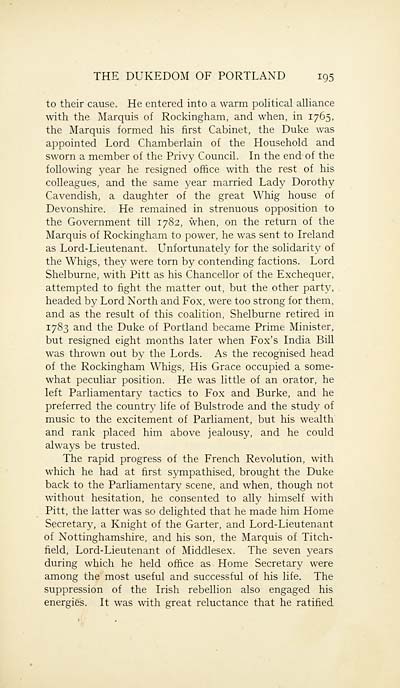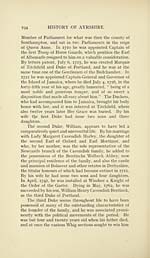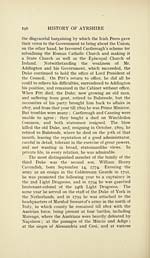Download files
Complete book:
Individual page:
Thumbnail gallery: Grid view | List view

THE DUKEDOM OF PORTLAND 195
to their cause. He entered into a warm political alliance
with the Marquis of Rockingham, and when, in 1765,
the Marquis formed his first Cabinet, the Duke was
appointed Lord Chamberlain of the Household and
sworn a member of the Privy Council. In the end of the
following year he resigned office with the rest of his
colleagues, and the same year married Lady Dorothy
Cavendish, a daughter of the great Whig house of
Devonshire. He remained in strenuous opposition to
the Government till 1782, when, on the return of the
Marquis of Rockingham to power, he was sent to Ireland
as Lord-Lieutenant. Unfortunately for the solidarity of
the Whigs, they were torn by contending factions. Lord
Shelburne, with Pitt as his Chancellor of the Exchequer,
attempted to fight the matter out, but the other party,
headed by Lord North and Fox, were too strong for them,
and as the result of this coalition, Shelburne retired in
1783 and the Duke of Portland became Prime Minister,
but resigned eight months later when Fox's India Bill
was thrown out by the Lords. As the recognised head
of the Rockingham Whigs, His Grace occupied a some-
what peculiar position. He was little of an orator, he
left Parliamentary tactics to Fox and Burke, and he
preferred the country life of Bulstrode and the study of
music to the excitement of Parliament, but his wealth
and rank placed him above jealousy, and he could
always be trusted.
The rapid progress of the French Revolution, with
which he had at first sympathised, brought the Duke
back to the Parliamentary scene, and when, though not
without hesitation, he consented to ally himself with
Pitt, the latter was so delighted that he made him Home
Secretary, a Knight of the Garter, and Lord-Lieutenant
of Nottinghamshire, and his son, the Marquis of Titch-
field, Lord-Lieutenant of Middlesex. The seven years
during which he held office as Home Secretary were
among the most useful and successful of his life. The
suppression of the Irish rebellion also engaged his
energies. It was with great reluctance that he ratified
to their cause. He entered into a warm political alliance
with the Marquis of Rockingham, and when, in 1765,
the Marquis formed his first Cabinet, the Duke was
appointed Lord Chamberlain of the Household and
sworn a member of the Privy Council. In the end of the
following year he resigned office with the rest of his
colleagues, and the same year married Lady Dorothy
Cavendish, a daughter of the great Whig house of
Devonshire. He remained in strenuous opposition to
the Government till 1782, when, on the return of the
Marquis of Rockingham to power, he was sent to Ireland
as Lord-Lieutenant. Unfortunately for the solidarity of
the Whigs, they were torn by contending factions. Lord
Shelburne, with Pitt as his Chancellor of the Exchequer,
attempted to fight the matter out, but the other party,
headed by Lord North and Fox, were too strong for them,
and as the result of this coalition, Shelburne retired in
1783 and the Duke of Portland became Prime Minister,
but resigned eight months later when Fox's India Bill
was thrown out by the Lords. As the recognised head
of the Rockingham Whigs, His Grace occupied a some-
what peculiar position. He was little of an orator, he
left Parliamentary tactics to Fox and Burke, and he
preferred the country life of Bulstrode and the study of
music to the excitement of Parliament, but his wealth
and rank placed him above jealousy, and he could
always be trusted.
The rapid progress of the French Revolution, with
which he had at first sympathised, brought the Duke
back to the Parliamentary scene, and when, though not
without hesitation, he consented to ally himself with
Pitt, the latter was so delighted that he made him Home
Secretary, a Knight of the Garter, and Lord-Lieutenant
of Nottinghamshire, and his son, the Marquis of Titch-
field, Lord-Lieutenant of Middlesex. The seven years
during which he held office as Home Secretary were
among the most useful and successful of his life. The
suppression of the Irish rebellion also engaged his
energies. It was with great reluctance that he ratified
Set display mode to:
![]() Universal Viewer |
Universal Viewer | ![]() Mirador |
Large image | Transcription
Mirador |
Large image | Transcription
Images and transcriptions on this page, including medium image downloads, may be used under the Creative Commons Attribution 4.0 International Licence unless otherwise stated. ![]()
| Histories of Scottish families > Ayrshire > Volume 2 > (205) Page 195 |
|---|
| Permanent URL | https://digital.nls.uk/95191558 |
|---|
| Attribution and copyright: |
|
|---|---|
| Description | A selection of almost 400 printed items relating to the history of Scottish families, mostly dating from the 19th and early 20th centuries. Includes memoirs, genealogies and clan histories, with a few produced by emigrant families. The earliest family history goes back to AD 916. |
|---|

